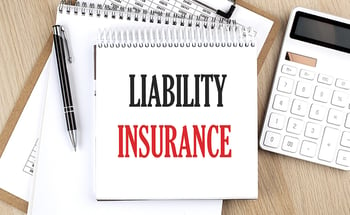Similar to legal malpractice suits, uncovered medi...
 Business demands may cause you to overlook issues that could result in a negligence claim, yet professional liability insurance can help relieve that burden.
Business demands may cause you to overlook issues that could result in a negligence claim, yet professional liability insurance can help relieve that burden.
Negligence claims, also known as tort claims, cost business owners time and money—sometimes lots of money. A report by the U.S. Chamber of Commerce Institute for Legal Reform shows that tort costs were $343 billion in 2020 which is the most recent figure.
We’ll outline even more reasons why you should protect your business against negligence claims as we discuss the types of negligence claims you could face and how professional liability insurance works to protect your business against them.
A single negligence claim can cause dire consequences for your business. They can financially drain your resources, impact your reputation, and cause your insurance premiums to increase.
Without the benefit of professional liability insurance, you may have to pay legal fees, settlements, court costs, and more. In certain situations, a business’s creditors may be able to go after your personal assets such as your house, car, bank account, or place liens on your property. Large settlements could lead to financial instability or bankruptcy.
Negligence claims can also tarnish your business’s reputation after negative publicity or news of the claim is spread online or by word of mouth. A poor reputation can impact sales, and your good name can be hard to rebuild.
Insurance companies are concerned about risks, and they will review your policy carefully before renewing it to evaluate whether your risk profile has changed. One or more negligence claims could increase your premium.
Beyond the money and the risk of diminishing your branding, negligence claims can divert time and resources away from your business as legal and financial matters take precedence, so it’s important to understand the various types of negligence claims that could be brought against you.

While you may not feel as though you or your business was negligent, a court may see things differently. Here’s a brief look at how the legal system views negligence claims.
Judges consider the following three things when deciding whether a business owner was negligent:
If the case meets all of these conditions, a lawsuit may progress. If it does, the court may categorize a negligence claim in one of three ways—contributory negligence, comparative negligence, or assumption of risk.
In this type of negligence, if an injured party contributed to their injuries in any way, even in a small way, they have no right to recover damages from the business owner.
With a comparative negligence approach, a judge will base the damages on a percentage of fault. An injured party who is 30% at fault can still recover 70% of the damages from the business owner. In some locations, judges follow a modified comparative negligence model where injured parties can only recover damages if they’re less than 50% responsible for a loss.
Assumption of risk means that if an injured party knowingly and willingly assumed the risks in the activity that caused them to become injured, they can’t hold the business owner liable for their injuries.
Such doctrines play a role in determining which party is liable and who must pay damages in personal injury cases so that settlements are fair and equitable.
Business owners who purchase professional liability have the benefit of protection despite how the attorneys and the court settle a negligence claim.
In simple terms, professional liability insurance protects business owners if they make a mistake while providing professional services to their clients.
Also commonly known as errors and omissions insurance (E&O), professional liability insurance pays for the following types of claims:
Your clients and customers can sue your business even if you didn’t do anything wrong or you don’t believe you’ve made a mistake.
Professional liability insurance protects your business by covering the following expenses:
Legal battles can be extensive and expensive, and a professional liability policy decreases the chance that you will have to fund the full amount of a negligence claim out of your own pocket.
You may be required to purchase professional liability insurance to complete a contract, and in some states, you may be required by law to purchase professional liability insurance. Nonetheless, anyone who provides professional services or regularly gives advice to clients should have professional liability insurance.
No matter how careful you are in your business, mistakes happen. A professional liability insurance policy will help alleviate the constant worry over a possible negligence claim that could negatively impact your business.
To learn more about how a professional liability policy can protect your business, contact the Leap Carpenter Kemps Insurance Agency. Call 209-384-0727 today for a quote.
Quality matters, and when it comes to insurance, it's no exception. We get it—saving money is important, but insurance coverage is where you want to invest wisely.
While low-priced insurance might seem appealing, it's only a good deal if it truly protects what matters most to you. Before you jump at those enticing low premiums, take a moment to think about what might be missing from that policy and how it could impact you in the long run. Download our free eBook to learn more!
Similar to legal malpractice suits, uncovered medi...
You get all the benefits and advantages of being a...
Natural disasters and crimes can impact a business...
Leap | Carpenter | Kemps Insurance Agency provides Commercial Business Insurance, Employee Benefits, Life and Health Insurance, and Personal Insurance to all of California, including Merced, Atwater, Los Banos, Mariposa, Madera, Fresno, Modesto, Turlock, and Stockton.
CA License Number 0646081 | Licensed to do business in California, Arizona, Hawaii, Idaho, Montana, Nevada, North Carolina, Oklahoma, Oregon, Virginia, West Virginia and Washington.
© Copyright 2023 Leap | Carpenter | Kemps Insurance Agency — Privacy Policy | Terms & Conditions.
Merced Office
3187 Collins Drive
Merced, CA 95348
Phone: (209) 384-0727
Additional Contacts
Toll Free: (800) 221-0864
Fax: (209) 384-0401